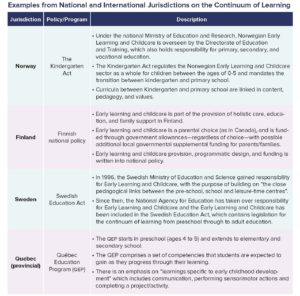Connecting the Dots: Early years as the starting point for a continuum of learning
It’s time to create a new seamless learning journey for children.
If Canada is going to compete internationally, if our children are going to be ready to face a world we can’t imagine yet, it’s time to address the gaps in our education systems.
Young people are not adequately prepared for the future, in part, due to the barriers across education systems and sectors. It’s time to connect the dots and build a “Continuum of Learning” that starts with early childhood education and supports our children right through their post-secondary years – a seamless education experience that prepares them to achieve their fullest potential. Children in Canada have a right to education – it’s time to make that a right to quality education.
Laying the groundwork for change
“Connecting the Dots: Early years as the starting point for a continuum of learning”, is the latest report from People for Education. It outlines the organization’s Future of Education Initiative focusing on the Continuum of Learning. The initiative will provide policy-ready ideas, drive a new conversation about education from early childhood to post secondary, build networks, and curate the latest in research on strategies that weave together the funding, policies, and learning goals for the whole education experience – setting the stage for shared and sustained prosperity for all.
It starts with early learning
Early childhood education is the basis upon which all other learning rests. Research shows children in quality early learning and childcare programs are often better prepared for kindergarten, elementary and secondary school. They develop important skills for the future, such as critical and creative thinking, curiosity, collaboration, and communications skills. The research is clear that the early development of those skills is a predictor of success well into high school and beyond.
Quality early learning and childcare is also a critical safety net for children who may arrive in kindergarten unprepared for learning. Research shows that the gaps only grow wider for children who are behind in skills development from the very first days of their school experience.
Up to now, early learning and childcare has been considered an adjunct, separate from the rest of the education systems in Canada, and policies surrounding it are, for the most part, developed separately from K-12 education policy.
Lack of alignment across systems leads to fade out of skills developed early
The report from People for Education shows that, to be truly effective, and based on experience in other countries, early learning and childcare needs to be embedded into the funding, policies and learning goals of the whole education system. Data suggest the skills children develop in early learning “fade out” in the elementary system because of the lack of coordination between education systems. The lack of alignment between early years education and K-12 is mirrored further down the continuum where post-secondary institutions have different goals and outcome measures than K-12.
A scan of Canadian and Scandinavian systems shows the differences and the possibilities.
New skills and competencies include far more than technology
The global conversations around what the future will look like and what skills and competencies our populations will need go far beyond innovation and technology. When experts refer to the Fourth Industrial Revolution, they talk about skills and competencies that include “… a fundamental change in the way we live, work and relate to one another. It is a new chapter in human development…”
The competencies, knowledge, and skills associated with this next phase – the ability to communicate, collaborate, self-advocate, self-regulate, and problem-solve – are established early in life. They are the building blocks of success.
“Whether the focus is on the need for a creative, inquiring and resilient citizenry, equity of opportunity and poverty reduction, the early identification and intervention of mental health issues or a flexible all-hands on deck workforce, there is simply no better nation-building investment than universal, non-profit, accessible and developmentally rich early childhood education and care.” – Charles Pascal
Time for a commitment to a public system of early learning and childcare
It’s time to address the varied commitments Canada and its provinces have made to support early childhood education and childcare across the country. The federal government’s spring budget included a 5-year $30-billion commitment to childcare. According to the Margaret and Wallace McCain Family Foundation, this represents a move “away from the current market approach to a view of early learning and childcare as a public good.”
Early learning and high-quality childcare are crucial first steps not just for the child, the family, and the community, but for Canada as a whole as we navigate our collective way into the future.
“Canada needs to ‘connect the dots’ across education systems to promote a continuum of learning starting in the early years to K-12, and beyond. To ensure an effective coherent continuum of learning, early learning and childcare must be publicly funded, publicly governed, and embedded in our public education systems.” Annie Kidder, Executive Director, People for Education

